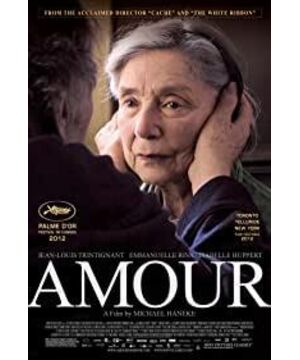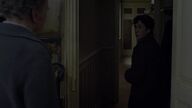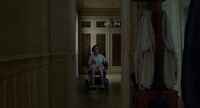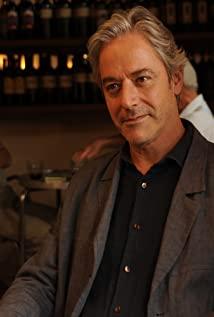In 2006, a 75-page book "Letter to D | Love History" came out in France. One year later, 84-year-old author André Gorz and her 82-year-old terminally ill wife, Dorina, opened it at home. Gas, both passed away. The sixty years of love between the two could not escape the humiliation of the years. In 2012, the movie "Love" was screened in Cannes, France. In the film, the old man George couldn't bear his partner Anne's body and personality slowly disintegrating in illness. She ended her life with a pillow, leaving a suicide note, leaving her life and death uncertain. In the two stories, there is no ambiguity, lingering, staying together, or even betrayal that love is good at, but they both use a decisive way to tell what it is not good at-eternity. "Love" has the film techniques of director Haneke, restrained on-site scheduling, fixed-camera long shots, and focus on capturing sound outside the camera, all of which are deeply influenced by the film master Robert Bresson. Almost all of the scenes in "Love" take place in a closed space. The oil paintings, old-fashioned chairs and pianos in the room are extremely elegant, which makes it easy to think of the interior stage style of French New Wave director Roma. Haneke said that in order to create the living conditions of the elderly, he deliberately found the apartment where his mother and stepfather lived, and the room layout remained the same. For example, after Annie's death in the film, George has been living in a small room next to the kitchen, which is also copied from the life of his stepfather after the death of his mother. These treatments have made the film gentle and restrained, without losing the strength to alert the audience. The story of "Love" takes place between an elderly couple. The two are like-minded, live a good life, and enjoy each other. Until one day, Annie was detected with an arterial embolism. After the operation failed, her body function declined, her brain memory was weakened, and she even lost her mobility and language skills. How to face the physical and mental decline of his lover has become a difficult problem facing her husband George. George promised Anne not to send her to the hospital anymore, and to do it personally, to take care of her lover's daily life alone. However, Annie's health is deteriorating, the doctor can do nothing about it, and the husband and daughter are helpless. For George, although the lover is still by your side, the original life is no longer there. She no longer listened to concerts, read books with him, no longer shared views with each other, no longer recalled the past together, and no longer had the same mind. Feeling guilty, Annie gradually gets tired of being taken care of, ashamed of seeing outsiders, to meet those eyes that are either surprised or pitying. There are three hints in the film that Annie has decided to go. First, George returned from an old friend’s funeral and saw Anne sitting down in the window, he knew that his lover had committed suicide by jumping off the building; second, Anne asked to look through the album of old events after a meal, feeling the beauty of life, but at the same time frankly confessed that for her Life is too long; the third is loss After taking care of herself, she refused to eat, and she vomited all the water that George gave to her mouth. Especially after the ignorant nanny humiliated her with a sharp comb and a ruthless mirror, she has no attachment to the world anymore. And what about George at this time? Is it to continue to humiliate her for the endless years, or to kill her for the rest of her life as she wishes? Director Michael Haneke had such an experience. The aunt whom he brought up since childhood, was disabled at the age of 92 and was unable to take care of herself. She asked Haneke to help her end her life, but was rejected. In the end, she ended her life by suicide. Haneke said frankly that whether he should help her end her life, this question has been bothering him. There are two fierce controversies in "Love". Once happened between George and Annie, George asked Annie what would she do if the two changed positions? Another time, the daughter wondered why the father didn't send her mother to the hospital for treatment. The father expressed her mother's feelings and asked again, what would the daughter do if the two changed positions? The results of the two disputes were speechless.
I love you, so my unreasonable fulfillment and tolerance without preconditions, can this be the reason for me to end your life? In fact, the dilemma of choice is that a person can never rely on his own experience to compare different choices. Whether at the time or afterwards, the comparison is carried out in imagination. Once a choice is made, it means to exclude All other possible choices. Even if a choice is made, the dilemma of choice has not been eliminated at all, and it has turned into a dilemma of introspection to torture us again. In the film, George had a nightmare. He heard someone knock on the door, so he walked out of the apartment and saw that the hallway was not completely decorated late at night, and there was no one, and his feet were soaked in cold water. Suddenly he stretched out a hand behind his back to cover his nose and suffocated him. On the one hand, Haneke told the audience that the lives of George and Annie had long been lifeless, and on the other hand, he also hinted that the dilemma of this choice has always existed. The two pigeons in the film break into the living room, which is also a selection dilemma arranged by Haneke. The first happened after George realized that Annie had a heart to death, and George drove it out of the window and set it free; the second happened after George killed his wife, and he caught it with a blanket and imprisoned it. freedom of. Hanek used two identical scenes to give the protagonist two identical choices: as he wished, confine his life in a small and closed space? Or against its wishes, exiled it to the wider world? At the end of the film, George smothered Anne with a pillow, and Haneke also made his own difficult and cold choice in this action. Many viewers are puzzled about this, even wondering, to help their lover die, is this "love"? After Annie's death, George lived alone in a cramped space beside the kitchen. The content of his suicide note is not explained in the film. But we can get a glimpse from another suicide note. Gorz wrote in "A Letter to D | Love History": "Soon you will be eighty-two years old. Your height is shortened by six centimeters and your weight is only forty-five kilograms. But you are as beautiful and elegant as ever, and I am moved. . We have spent fifty-eight years together, and my love for you has grown stronger and stronger. I have this annoying void in my chest again, only when your hot body is nestled in my arms, it can Filled up." This must be what George was writing to Annie. "Letter D | Love History" also wrote: "I do not want to attend your cremation funeral, nor receive a box containing your ashes. I heard Catherine Ferrier singing, "The world is empty, I Don’t want to live long’, and then I woke up. We don’t want to live alone after the other party has gone. We often say to each other that if there is an afterlife, we are still willing to spend it together. "To die together, it’s Gotz Declaration, commitment and staying together with Dorina, Let posterity sigh. The pillows, seals, and daisies were George’s promises of immortality to Annie. He promised that Annie would not send her to the hospital, so that she would not move her out of the apartment after her death. The four walls of the apartment are coffins where lovers live. Seals and daisies make this non-existent funeral solemn and solemn, so that the dead can be dignified and the living can be comforted. I can't help but think of Yeats's poem: Although there are many branches, there is only one root. Through all the lying days of my youth, I shake off my branches and flowers in the sun, and now I can wither and enter the truth. ...In the bravery of love, there are no lies, only eternity.
View more about Amour reviews










